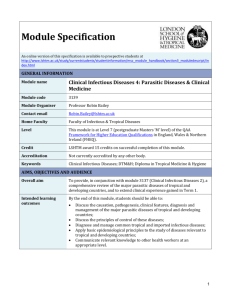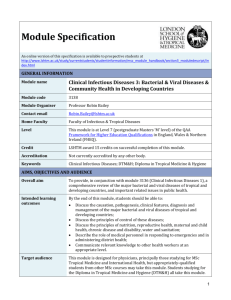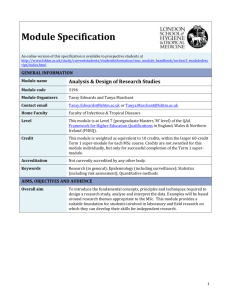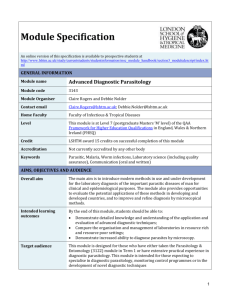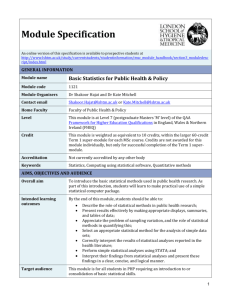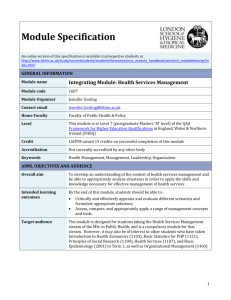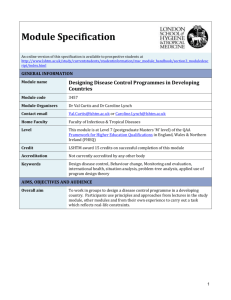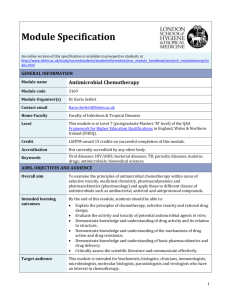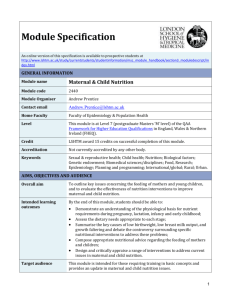3122 Parasitology & Entomology Module Specification
advertisement
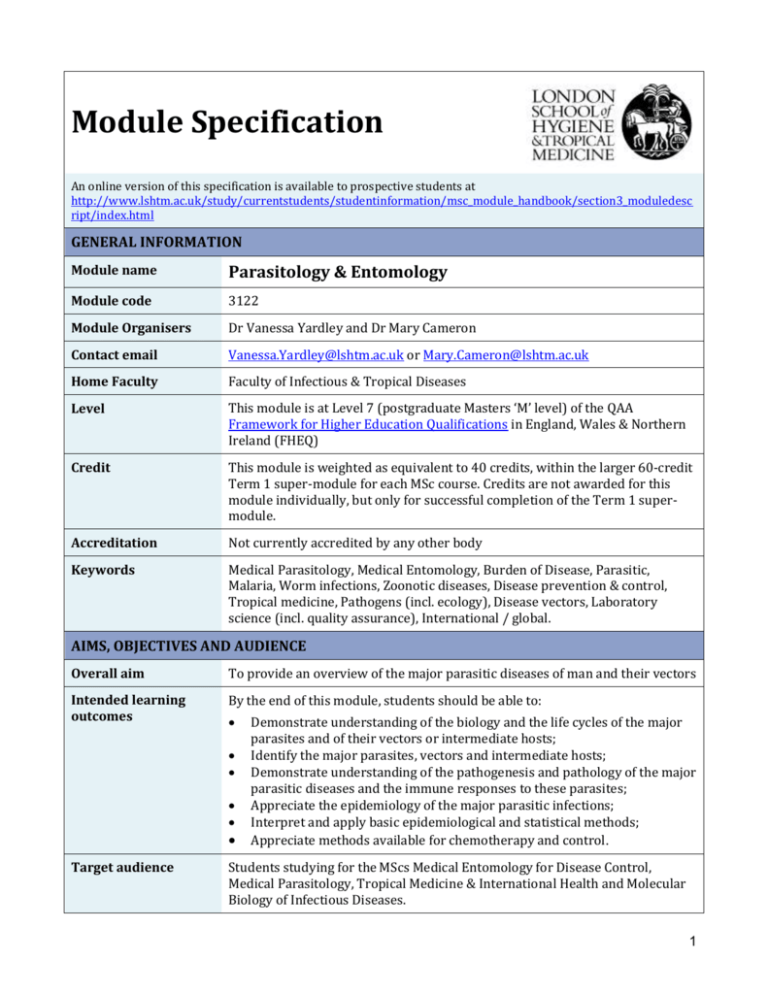
Module Specification An online version of this specification is available to prospective students at http://www.lshtm.ac.uk/study/currentstudents/studentinformation/msc_module_handbook/section3_moduledesc ript/index.html GENERAL INFORMATION Module name Parasitology & Entomology Module code 3122 Module Organisers Dr Vanessa Yardley and Dr Mary Cameron Contact email Vanessa.Yardley@lshtm.ac.uk or Mary.Cameron@lshtm.ac.uk Home Faculty Faculty of Infectious & Tropical Diseases Level This module is at Level 7 (postgraduate Masters ‘M’ level) of the QAA Framework for Higher Education Qualifications in England, Wales & Northern Ireland (FHEQ) Credit This module is weighted as equivalent to 40 credits, within the larger 60-credit Term 1 super-module for each MSc course. Credits are not awarded for this module individually, but only for successful completion of the Term 1 supermodule. Accreditation Not currently accredited by any other body Keywords Medical Parasitology, Medical Entomology, Burden of Disease, Parasitic, Malaria, Worm infections, Zoonotic diseases, Disease prevention & control, Tropical medicine, Pathogens (incl. ecology), Disease vectors, Laboratory science (incl. quality assurance), International / global. AIMS, OBJECTIVES AND AUDIENCE Overall aim To provide an overview of the major parasitic diseases of man and their vectors Intended learning outcomes By the end of this module, students should be able to: Target audience Demonstrate understanding of the biology and the life cycles of the major parasites and of their vectors or intermediate hosts; Identify the major parasites, vectors and intermediate hosts; Demonstrate understanding of the pathogenesis and pathology of the major parasitic diseases and the immune responses to these parasites; Appreciate the epidemiology of the major parasitic infections; Interpret and apply basic epidemiological and statistical methods; Appreciate methods available for chemotherapy and control. Students studying for the MScs Medical Entomology for Disease Control, Medical Parasitology, Tropical Medicine & International Health and Molecular Biology of Infectious Diseases. 1 CONTENT Session content The module is expected to include sessions addressing the following topics (though please note that these may be subject to change): For each disease, consideration will be given successively to: biology, life cycles, diagnosis and vector identification (where appropriate), pathogenesis and pathology, immunology, epidemiology, treatment and control. Vector concepts and parasite transmission Biology and control of parasitic diseases. TEACHING, LEARNING AND ASSESSMENT Study resources provided or required A folder containing timetable, module description and feedback sheets is provided to students at the beginning of the module. Lecture notes and reading lists are provided for each lecture and also available on Moodle. Practical handbooks are provided for the Parasitology lab and the Entomology lab sessions respectively. Relevant texts for this module are available from the School library. Teaching and learning methods About half the time will be spent on theoretical work and half on practicals. Laboratory work is particularly important, since, in addition to practical instruction, there is ample opportunity for in-depth discussion with students on aspects of particular interest. To facilitate this, a substantial number of staff will attend each practical session. Students taking the MSc Tropical Medicine & International Health course will spend each Wednesday at the Hospital for Tropical Diseases. The rest of the class will have private study at these times. In addition, for the first five weeks MSc Tropical Medicine & International Health students will study Clinical Trials on Thursday afternoons while the rest of the class are taught specialized aspects of medical entomology. MSc Tropical Medicine & International Health students will have the opportunity to see insect vectors from these sessions in the relevant parasitology laboratory classes. Assessment details A tutor-marked essay of the students' own choice plus a mock written examination, neither of which count towards formal assessment, will be completed during the first term for the purpose of internally monitoring student progress. A practical examination will be held in week 11 of the module. For MSc MEDiC and MSc MP students this will consist of a “sit down” element (a review of a number of slide specimens to include a blood film, a faecal specimen and a tissue sample) and a "spots test” (40 individually numbered items and microscope specimens for students to identify). Students from other MSc courses will only take the “spots test”. These practical elements count as the degree practical exam for the respective MSc disciplines. The practical exam tests students’ competence in identification of the major parasites, their vectors and intermediate hosts. It will be preceded by practical revision sessions. This module is formally assessed by written examination in June. For students who are required to re-sit, or granted a deferral or new attempt, the practical examination will be held in the December of the following academic year (2016-17) and the written examination will be held in May/June of the following academic year. 2 Assessment dates Practical assessment will take place on Thursday 17 December 2015(TBC). For students who are required to re-sit, or granted a deferral or new attempt the practical examination will be held in December 2016 at LSHTM. The re-sit of the written examination (Paper 1) will be held in May/June 2017 and this can be arranged through an overseas site. Language of study and assessment English (please see ‘English language requirements’ below regarding the standard required for entry). TIMING AND MODE OF STUDY Duration The module runs for 10 weeks at 2.5 days per week; this module runs on Mondays, Tuesday mornings and Thursdays. There is one allocated Reading Week (with no classes) halfway through the module. Dates For 2015-16 the module will start on Monday 5 October 2015 and finish on Friday 18 December 2015. Timetable slot The module runs in LSHTM timetable slot Term 1 Mode of Study The module is taught face-to-face in London. Both full-time and part-time students follow the same schedule. Learning time The notional learning time for the module totals 400 hours, consisting of: Contact time ≈ 122 hours Directed self-study ≈ 138 hours Self-directed learning ≈ 70 hours Assessment, review and revision ≈ 70 hours APPLICATION, ADMISSION AND FEES Pre-requisites Parasitology & Entomology assumes no prior knowledge of medical parasitology or entomology. English language requirements A strong command of the English language is necessary to benefit from studying the module. Applicants whose first language is not English or whose prior university studies have not been conducted wholly in English must fulfil LSHTM’s English language requirements, with an acceptable score in an approved test taken in the two years prior to entry. Applicants may be asked to take a test even if the standard conditions have been met. Student numbers Student numbers are typically 45 per year; numbers may be capped due to limitations in facilities or staffing. Student selection Preference will be given to LSHTM MSc students, particularly those registered for MScs listed under ‘Target audience’, and LSHTM research degree students. Other applicants meeting the entry criteria will usually be offered a place in the order applications are received, until any cap on numbers is reached. Applicants may be placed on a waiting list and given priority the next time the module is run. Partial Registration (partial participation) by LSHTM research degree students is allowed for this module. However, LSHTM research degree students must discuss attendance requirements with the Module Organisers beforehand as attendance may be restricted to lectures only; attendance at practical sessions is strictly dependent on student numbers. 3 Fees For registered LSHTM MSc students, fees for the module are included within MSc fees (given on individual course prospectus pages). If registering specifically for this module, as a stand-alone short course, individual module fees will apply. Tuition fees must be paid in full before commencing the module, or by any fee deadline set by the Registry. Scholarships Scholarships are not available for individual modules. Some potential sources of funding are detailed on the LSHTM website. Admission deadlines For 2015-16: For registered LSHTM MSc students, the module choice deadline is the end of Term 1 Orientation Week, Friday 2 October 2015. If registering specifically for this module, applications may be made at any time. The School gives priority to the needs of students registering for Masters and Research Degrees, and so places on any module may be limited - early application is therefore advised. Formal registration will take place on the morning of the first day of the module. ABOUT THIS DOCUMENT This module specification applies for the academic year 2015-16 Last revised: 5 August 2014 by Vanessa Yardley. Minor amendments Sarah Bathie 10th July 2015 London School of Hygiene & Tropical Medicine, Keppel St., London WC1E 7HT. www.lshtm.ac.uk 4

